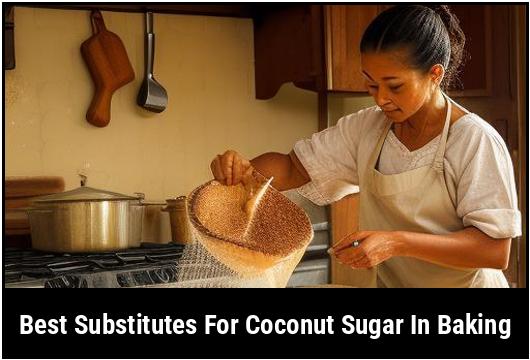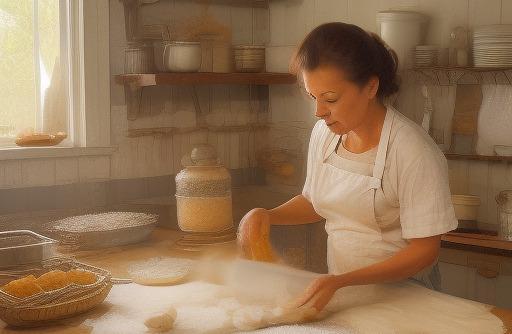Best Substitutes For Coconut Sugar In Baking

Coconut sugar has gained popularity in recent years as a healthier alternative to refined sugar. It is derived from the sap of coconut palm trees and has a rich caramel-like flavor. Its low glycemic index and nutrient content make it an appealing choice for those looking for a natural sweetener.
However, despite its numerous benefits, coconut sugar may not always be readily available or may not suit everyone’s taste. In such cases, it becomes essential to find suitable substitutes that can provide similar taste and texture to your baked goods. In this article, we will explore the best substitutes for coconut sugar in baking and guide you on how to choose and use them effectively.
Key Takeaways
- Coconut sugar, derived from the sap of coconut palm trees, is a popular natural sweetener known for its low glycemic index and rich caramel-like flavor.
- The best substitutes for coconut sugar in baking include brown sugar, maple syrup, honey, date sugar, and stevia.
- Factors to consider when choosing a substitute include taste, texture, sweetness level, and glycemic index.
- Each substitute may require adjustments in measurements and baking time, so it’s important to follow recipe guidelines and experiment as needed.
Why You Need A Substitute For Coconut Sugar In Baking
There are several reasons why you might need a substitute for coconut sugar in baking. Here are a few common scenarios:
-
Unavailability: Coconut sugar may not be readily available in your area, or you might have difficulty sourcing it. In such cases, having a suitable substitute on hand can save you from having to abandon a recipe.
-
Preference: While many enjoy the unique flavor of coconut sugar, others may not be fond of it or may be allergic to coconut. Finding a substitute can help you achieve the desired taste without compromising on the quality of your baked goods.
-
Health Considerations: Coconut sugar is often praised for its low glycemic index, making it a popular choice for those managing blood sugar levels. However, some individuals may need to further limit their sugar intake, in which case using an alternative sweetener might be necessary.
By exploring different substitutes, you can customize your baked goods to suit your taste preferences and dietary needs.
Types Of Substitutes For Coconut Sugar In Baking

There are several types of substitutes that can be used in place of coconut sugar. Each one brings its own unique flavor, sweetness level, and nutritional benefits to the table. Here are some popular options:
-
Brown Sugar: Brown sugar is a common substitute for coconut sugar in baking. It is a combination of granulated sugar and molasses, which gives it a moist texture and a rich, caramel-like flavor. Brown sugar can be used in a 1:1 ratio for coconut sugar in recipes.
-
Maple Syrup: Maple syrup is a natural sweetener made from the sap of maple trees. It has a distinct flavor profile with hints of caramel and a thick consistency. When using maple syrup as a substitute, replace one cup of coconut sugar with three-fourth cup of maple syrup. Also, reduce the amount of liquid in the recipe by about three tablespoons to maintain the right consistency.
-
Honey: Honey is another excellent substitute for coconut sugar, offering a sweet and floral flavor profile. It adds moisture and richness to baked goods. Replace one cup of coconut sugar with three-fourth cup of honey and reduce the amount of liquid in the recipe by two tablespoons.
-
Date Sugar: Date sugar is derived from dried dates and is considered a whole food sweetener. It has a similar flavor profile to coconut sugar, with a rich and caramel-like taste. Use an equal amount of date sugar as you would coconut sugar in recipes.
-
Stevia: Stevia is a natural sweetener extracted from the leaves of the Stevia rebaudiana plant. It is extremely sweet, so only a small amount is needed to replace coconut sugar. Stevia is often available in powdered or liquid form, and it is important to follow the manufacturer’s instructions for the appropriate conversion.
Each substitute brings its own unique characteristics to your baked goods, so it’s worth experimenting to find the one that suits your taste preferences and dietary needs.
Best Substitutes For Coconut Sugar In Baking
Based on their flavor profiles and versatility, the following substitutes are considered the best options for replacing coconut sugar in baking:
-
Brown Sugar: With its similar caramel-like flavor, brown sugar is an excellent substitute for coconut sugar. It adds moisture and richness to baked goods, making them soft and tender. Use a 1:1 ratio of brown sugar in place of coconut sugar in recipes.
-
Maple Syrup: Maple syrup adds a distinct flavor to baked goods, with a natural sweetness and hints of caramel. It enhances the richness of your recipes and helps keep them moist. Replace one cup of coconut sugar with three-fourth cup of maple syrup and reduce the liquid content slightly.
-
Honey: Honey offers a sweet and floral taste that complements a variety of baked goods. It also provides moisture, resulting in tender and flavorful treats. Substitute three-fourth cup of honey for one cup of coconut sugar, reducing the liquid content accordingly.
-
Date Sugar: Date sugar shares a similar caramel-like taste with coconut sugar, making it an excellent substitute. It is less sweet than regular sugar, which can be beneficial for those looking to reduce their sugar intake. Use an equal amount of date sugar as you would coconut sugar in recipes.
-
Stevia: Stevia is an extremely sweet substitute for coconut sugar, making it ideal for those looking to reduce their sugar consumption. It is available in both powdered and liquid forms. Follow the manufacturer’s instructions for the appropriate conversion, as the sweetness level can vary.
These substitutes provide a range of flavors and sweetness levels, allowing you to achieve the desired taste in your baked goods while also keeping your dietary needs in check.
Choosing The Right Substitute For Coconut Sugar In Baking
When choosing a substitute for coconut sugar in baking, several factors need to be considered to ensure the best results. Here are some key points to keep in mind:
-
Flavor Profile: Consider the flavor profile of the substitute and how it will complement the other ingredients in your recipe. Brown sugar and maple syrup offer caramel-like flavors, while honey has a sweet and floral taste. Date sugar provides a similar caramel-like flavor to coconut sugar. Stevia, on the other hand, is extremely sweet and may need adjustments to the recipe to balance the taste.
-
Texture: Coconut sugar adds moisture and richness to baked goods. When choosing a substitute, consider how it will impact the texture of the final product. Brown sugar, maple syrup, and honey all provide moisture to the recipe, resulting in soft and tender treats. Date sugar is less moist but still contributes to the overall texture.
-
Sweetness Level: Coconut sugar has a moderate sweetness level. Consider the sweetness level of the substitute and adjust it according to your taste preferences. Brown sugar, maple syrup, and honey offer similar sweetness levels when used in the recommended ratios. Date sugar and stevia may need adjustments to achieve the desired taste.
-
Glycemic Index: Coconut sugar is often chosen as a low glycemic index alternative to refined sugar. If you are looking for a substitute with a similar glycemic index, consider honey, which has a lower impact on blood sugar levels compared to other sweeteners. Stevia is a non-caloric sweetener with a glycemic index of zero, making it an excellent option for those managing blood sugar.
By considering these factors, you can select the right substitute that aligns with your taste preferences, dietary needs, and desired outcome.
Pro Tip: When using substitutes for coconut sugar in baking, it’s essential to experiment and adjust your recipe if necessary. Factors like moisture content, sweetness level, and baking time can differ when using different substitutes. Start by making small adjustments and gradually increase or decrease as needed.
Cooking With Substitutes For Coconut Sugar In Baking
Using substitutes for coconut sugar in baking requires a thoughtful approach to ensure the best results. Here are some guidelines to follow:
-
Measurements: Ensure accurate measurements when replacing coconut sugar with a substitute. Use a 1:1 ratio for brown sugar and date sugar. Replace one cup of coconut sugar with three-fourth cup of maple syrup or honey and adjust the liquid content accordingly. Stevia may require much smaller amounts, so follow the manufacturer’s instructions.
-
Texture Adjustments: Depending on the substitute used, you may need to make adjustments to the recipe’s moisture content. Brown sugar, maple syrup, and honey provide moisture, so reducing the amount of other liquids in the recipe might be necessary. Date sugar is less moist, but the overall texture should still be retained. Stevia does not contribute moisture, so making additional adjustments to the recipe may be required.
-
Baking Time: Keep in mind that substituting coconut sugar with other sweeteners may affect the overall baking time. Pay attention to the texture and color of your baked goods and adjust the baking time if needed. It’s always best to rely on visual cues and perform the toothpick test to determine if the item is fully baked.
-
Flavor Enhancements: If you choose a substitute that has a milder flavor than coconut sugar, consider adding additional flavor enhancers to your recipe. For example, adding vanilla extract, cinnamon, or nutmeg can enhance the overall taste profile of your baked goods.
With these guidelines in mind, you can confidently substitute coconut sugar in your favorite baking recipes while achieving delicious and satisfying results.
Recipes Using Substitutes For Coconut Sugar In Baking
To help you get started, here are two delicious recipes that use substitutes for coconut sugar:
Maple Pecan Granola
Ingredients:
- 3 cups rolled oats
- 1 cup chopped pecans
- 1/2 cup shredded coconut
- 1/4 cup melted coconut oil
- 1/4 cup maple syrup (substitute for coconut sugar)
- 1 teaspoon vanilla extract
- 1/4 teaspoon salt
Instructions:
- Preheat the oven to 325°F (163°C) and line a baking sheet with parchment paper.
- In a large bowl, combine the rolled oats, chopped pecans, shredded coconut, melted coconut oil, maple syrup, vanilla extract, and salt. Mix well until all the ingredients are evenly coated.
- Spread the granola mixture onto the prepared baking sheet in an even layer.
- Bake for 20-25 minutes, or until golden brown, stirring halfway through to ensure even cooking.
- Remove from the oven and let the granola cool completely. As it cools, it will become crunchy.
- Store in an airtight container for up to two weeks.
Honey Whole Wheat Banana Bread
Ingredients:
- 1 3/4 cups whole wheat flour
- 1 teaspoon baking powder
- 1/2 teaspoon baking soda
- 1/4 teaspoon salt
- 1/2 cup mashed ripe banana (about 2 medium bananas)
- 1/2 cup plain Greek yogurt
- 1/3 cup honey (substitute for coconut sugar)
- 1/4 cup melted coconut oil
- 1 teaspoon vanilla extract
- 2 large eggs
Instructions:
- Preheat the oven to 350°F (175°C) and grease a 9×5-inch loaf pan.
- In a medium bowl, whisk together the whole wheat flour, baking powder, baking soda, and salt.
- In a separate large bowl, combine the mashed banana, Greek yogurt, honey, melted coconut oil, vanilla extract, and eggs. Mix well until all the ingredients are combined.
- Gradually add the dry ingredients into the wet ingredients, mixing until just combined. Avoid overmixing, as it can result in a dense loaf.
- Pour the batter into the prepared loaf pan and smooth the top.
- Bake for 45-55 minutes, or until a toothpick inserted into the center comes out clean.
- Allow the banana bread to cool in the pan for 10 minutes, then transfer it to a wire rack to cool completely.
- Slice and serve.
These recipes showcase the versatility of substitutes for coconut sugar and provide delicious alternatives for your baking endeavors.
Storage And Shelf Life Of Substitutes
It’s important to consider the storage and shelf life of the substitutes you choose, as they may differ from coconut sugar.
-
Brown Sugar: Brown sugar should be stored in an airtight container in a cool, dry place to prevent hardening. It has a long shelf life of several years if stored properly.
-
Maple Syrup: Maple syrup should be stored in the refrigerator after opening to maintain its freshness. It typically lasts up to one year.
-
Honey: Honey should be stored at room temperature in a sealed container away from direct sunlight. It has an indefinite shelf life, but its quality may deteriorate after a year or two.
-
Date Sugar: Date sugar should be stored in an airtight container in a cool, dry place. It can last up to two years if stored properly.
-
Stevia: Stevia in powdered form has a long shelf life and does not require any special storage. Liquid stevia should be stored in the refrigerator and used within a year.
Always check the specific instructions on the packaging for proper storage guidance and expiration dates.
Conclusion
While coconut sugar offers a unique flavor and nutritional benefits, finding suitable substitutes for baking is essential for those who cannot access it or prefer alternative options. Brown sugar, maple syrup, honey, date sugar, and stevia are excellent alternatives that can provide similar taste and texture to your baked goods.
When choosing a substitute, consider the flavor profile, texture, sweetness level, and glycemic index to find one that suits your needs. Experimenting with conversions and making slight adjustments to your recipes can help you achieve the best results. Remember to store the substitutes properly and consider their shelf life to maintain their freshness.
By exploring these substitutes and incorporating them into your baking, you can enjoy a wide variety of delicious treats while catering to your taste preferences and dietary requirements.
Pro Tip: When substituting coconut sugar for brown sugar, you can enhance the caramel-like flavor by mixing in a teaspoon of molasses. This will bring a deeper, richer taste to your baked goods.
Now, armed with this knowledge, go forth and create delectable baked treats with the best substitutes for coconut sugar!
FAQS
What Are Some Good Substitutes For Coconut Sugar In Baking?
There are several options that can work well as substitutes for coconut sugar in baking including brown sugar, maple syrup, honey, agave nectar, and date sugar. Each of these options has a slightly different flavor profile and sugar content, so it’s important to choose the one that will work best for your recipe.
Can I Use Brown Sugar Instead Of Coconut Sugar In Baking?
Yes, brown sugar can be a good substitute for coconut sugar in baking. Brown sugar has a similar flavor profile and texture, but is slightly sweeter than coconut sugar. Keep in mind that brown sugar also contains molasses, which can add a slightly different flavor to your recipe.
Is Maple Syrup A Good Substitute For Coconut Sugar In Baking?
Yes, maple syrup can be a good substitute for coconut sugar in baking. Maple syrup has a unique flavor compared to other sweeteners and can add a touch of complexity to your baked goods. Keep in mind that maple syrup is liquid, so it may affect the overall moisture of your recipe.
Can I Use Agave Nectar Instead Of Coconut Sugar In Baking?
Yes, agave nectar can be a good substitute for coconut sugar in baking. Agave nectar has a lower glycemic index than sugar, which can be beneficial for those looking for a lower glycemic load in their baked goods. However, agave nectar is much sweeter than coconut sugar, so you may need to adjust the amount used in your recipe accordingly.
What Is Date Sugar And Can It Be Used As A Substitute For Coconut Sugar In Baking?
Date sugar is made from dried dates that have been finely ground into a powder. It has a unique flavor profile that is similar to caramel and can work well as a substitute for coconut sugar in baking. However, date sugar is much less sweet than other sugars and has a tendency to clump, so it may not be the best choice for every recipe.
Sources
About the Author Jenny
I'm Jenny, a housewife with an unwavering passion for food. My culinary journey began with my grandmother's kitchen, and it's now a full-fledged food blog. I've turned my love for cooking into a creative outlet, sharing recipes and stories with a global community of fellow food enthusiasts. It's proof that being a housewife can also mean pursuing your passions and savoring life's delectable moments.
